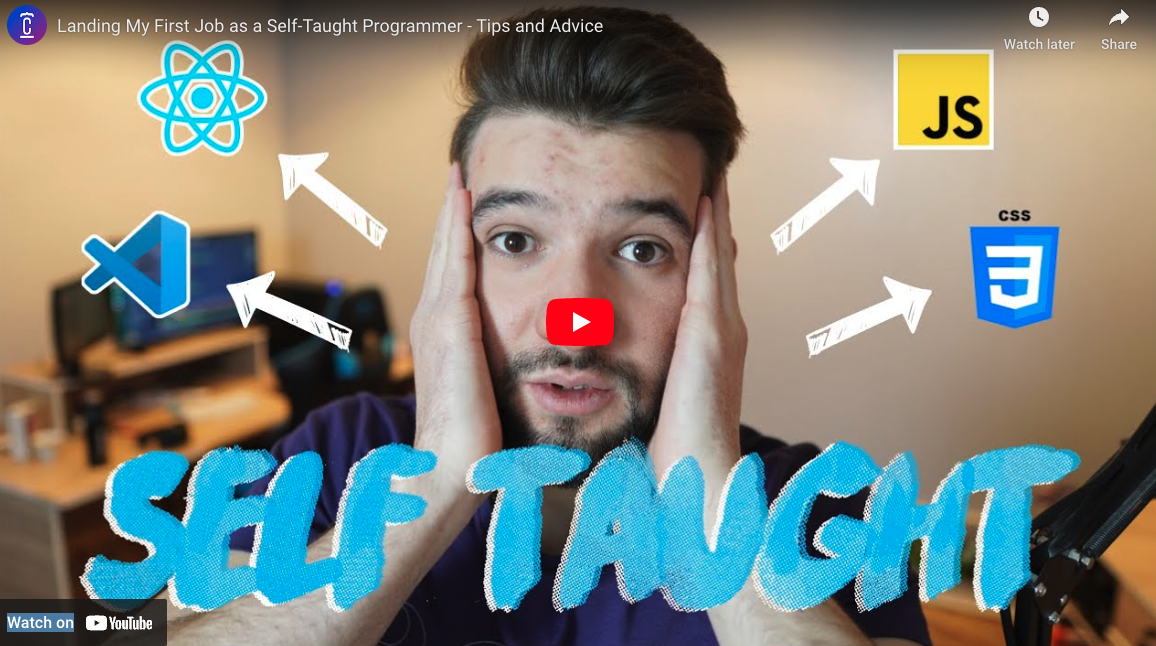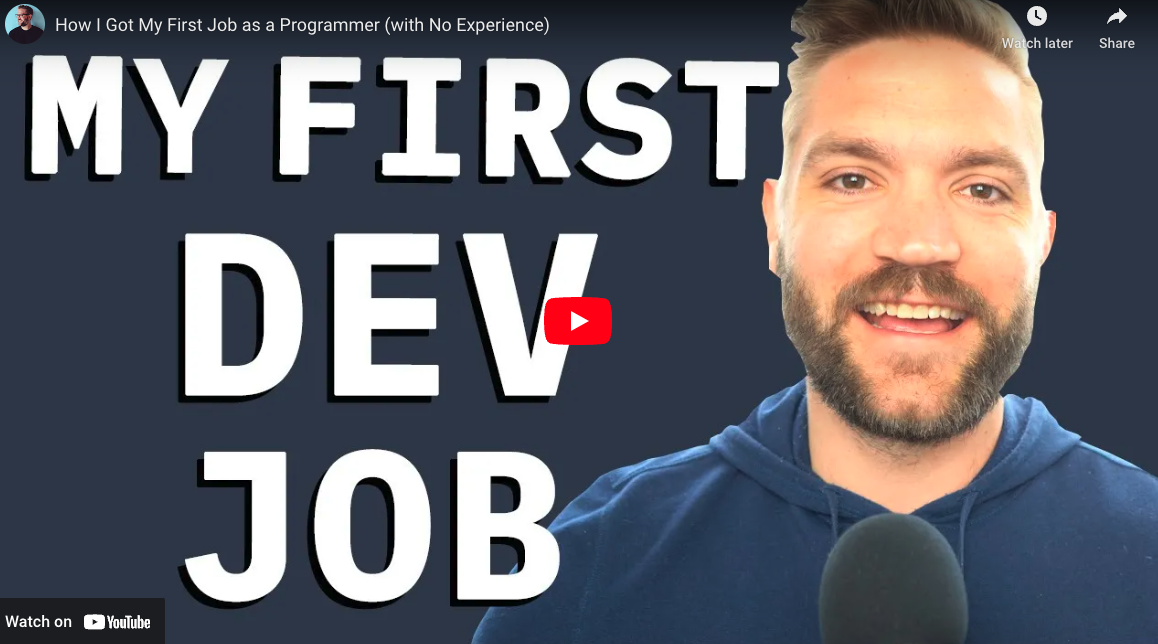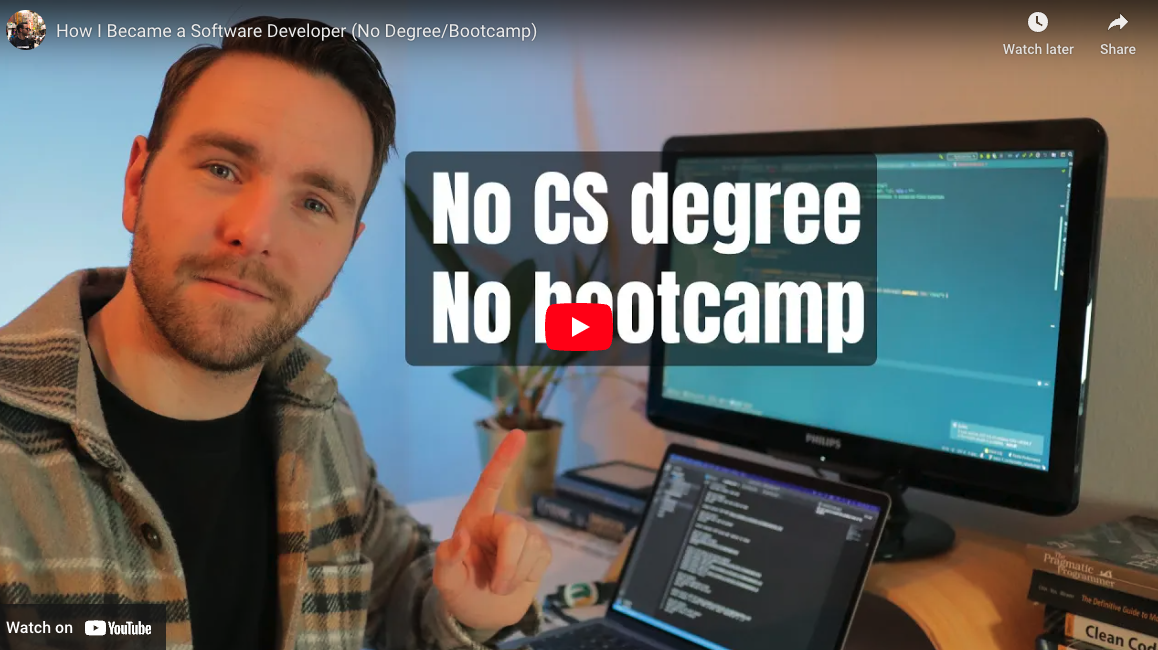Programming is already one of the most in-demand technical skills, and that demand is only going to keep growing. So if you’re looking to join this exciting profession, but don’t have a related degree, then you may be wondering: how do I get my foot in the door?
That’s why we’ve created this guide. Below, we’ll detail ten steps that you can take to land a programming job without a degree. We’ll also share some stories of talented programmers and developers who landed a job through independent learning or a bootcamp.
Want to find out how to get an entry-level job without a degree in programming? Then keep reading.
Table of Contents
Can You Get a Programming Job Without a Degree?
Yes—you don’t need a degree to land a high-paying programming job. But if you don’t have a degree, then you’ll need to build your expertise through self-learning, independent skill-building, online courses, programming podcasts, and bootcamps.


Become a Software Engineer. Land a Job or Your Money Back.
Code in the industry's most widely used programming languages. Test your knowledge through job-ready projects. Work 1:1 with an industry mentor. Land a job — or your money back.
How to Land a Programming Job Without a Degree
Here are steps that you can take to land a programming job if you don’t have a degree:
Learn the Fundamentals
Jumping straight into advanced tutorials might seem quicker to get your portfolio going. But, you must master the basics before picking a programming language, a niche, or even a bootcamp or course. Here are some starter concepts in the programming world:
- Syntax – Syntax refers to the rules that help build the structure for a programming language. Just like the English language has rules for sentence structure, so does a programming language, and the syntax encompasses these.
- Variables – These are units that may be assigned a value. For example, name= “Chandler,” print “Hi, name.” So the program will print “Hi Chandler”. You can change what “name” denotes.
- Algorithms – Formulas, instructions, or step-by-step processes that come together to solve a problem or present a solution are called algorithms.
- Data Structures – A digital bucket for storing and processing data within a computer program is called a data structure. These could be characters (a, b, c, d, etc.), integers (1, 383, -47489, etc.), booleans (true, false, etc.), or even more complex data structures like arrays and loops.
- Arrays and Loops – Variables that are categorized together are called arrays. Loops are scripts or instructions that repeat until given the command to stop.
Get To Know Other Software Engineering Students
Julia Ayres
Software Engineer at Northspyre
Oscar Herrera
Student In The Software Engineering Bootcamp at Springboard
Rafael Alvarado
IT Support Engineer at Amazon
Learn a Programming Language
There are many popular programming languages out there, and you may need to pick one or at least know the basics of a few of them.
- Python – Python programming language is one of the easiest to pick up. Python developers build websites and conduct software tests. It is one of the most versatile languages and can help with data visualization.
- JavaScript – This programming language is slightly advanced. It is used for web page development and app creation. JavaScript works on the client side of the web.
- C++ – As one of the most powerful and common programming languages, C++ is used to develop operating systems, games, etc. It is adaptable to different platforms. It is widely used across many areas of software development. Knowing C++ will benefit you greatly.
- Java – This programming language is used for desktop and mobile software applications, embedded systems, and big data processing workflows. Java is also a platform, meaning it has an embedded environment within which a program can run.
- Ruby – This is also an easy programming language to pick up. It has a similar syntax to C++. It is used to develop internet applications and is adaptable across a wide range of platforms.
Pursue a Course or Bootcamp
Once you have decided which programming language you want to focus on, consider a course or a bootcamp. Find one that covers the fundamentals of programming and teaches one or more of the programming languages. Assess the duration, financial commitment, reviews, and syllabus to take a call on which course or bootcamp would suit your needs.
Determine Your Specialization
Acquire and Master the Relevant Skills
To master your specialization, you’ll need a combination of technical skills and soft skills.
Technical Skills
- Programming Languages – Every job role related to programming requires experience in specific programming languages. Knowing one programming language well is good, and having a solid foundation in other languages is ideal.
- Algorithms and Data Structures – Programming requires a vast expanse of data processing and storage. This makes data structures (which store and process the data) and algorithms (which use the data) instrumental to programming.
- Development Frameworks – These are libraries with tools related to specific programming languages. Development frameworks assist software developers with web application building. Some examples are React, Knockback, MeteorJS, etc. You must know how to make the most out of development frameworks as a programmer.
- Debugging – As a programmer, finding, analyzing, and fixing bugs is a crucial skill. As a software developer, you should be able to locate and resolve bugs in a program.
Soft Skills
- Problem Solving – A programmer should understand how to create an algorithm for a computer to solve a problem as a human would. Without their problem-solving skills, an application or a website will not be able to function.
- Creativity – There can be many ways to create a code for the same result, but developers who can do it the most logically or creatively often stand out. Many developers see coding as solving a puzzle. It requires creativity to resolve a bug and reduce costs without compromising on web design quality.
- Flexibility and Adaptability – Any tech industry involves adaptability and flexibility. Programming languages and complexity levels of mobile apps and websites are constantly evolving. You need to be able to work with changing trends, platforms, and programming tools.
- Attention To Detail – You can write lines of code, but one small error can frustrate you for hours on end. Minor errors can halt websites and computer programs. Attention to detail is critical for those trying to get a programming job.
Create a GitHub Profile
A GitHub profile can act as your portfolio for potential employers. Create your GitHub profile to showcase your work. GitHub also provides a forum to collaborate with other developers and get assistance with programming-related questions.
Build a Portfolio With Open-Source Projects, Volunteer Work, Freelance Assignments, and Competitions
To gather some experience, consider using freelancing websites like Upwork and Fiverr. You can also volunteer to create websites for friends and families or local businesses. Another great way to gather personal projects is to participate in hackathons and other competitions.
Related Read: How To Land a Programming Job With No Experience
- Build Your Network – Whether you are self-taught or an online coding bootcamp graduate, devote some time to creating a network that can help you find opportunities and mentors.
- LinkedIn – Even if you don’t have “high-level” analytical posts to share, just putting yourself out there with stories can help. Talk about your journey as a programmer who didn’t go down the traditional route of taking a formal four-year degree. Your insights can help garner the attention of companies and potential mentors.
- Online Communities and Conferences – You can also leverage online communities like Reddit and seminars conducted by various organizations now and then to learn from others and have a community to fall back on for the trickier parts of your job search process.
- Hackathons – Hackathons are great opportunities to network because you can directly interact with industry experts and show them your work in a formal environment. Hackathons also have networking opportunities after the competition, where you can approach different organization reps with your portfolio.
Find a Mentor
A mentor can be the ideal career coach who will help you structure your next steps, especially when you have just completed the “learning” stage and are now looking for suitable job openings. If you are going down the bootcamp path, consider one with mentorship services.
Build Your Resume, Practice Your Interview Skills, and Start Applying
Now you can go ahead with building your resume, training for coding interviews, and getting some applications out there. Again, you can choose a bootcamp that helps shape programming careers through recruitment services. Support through mock technical interviews, resources to ace the interview process, lists of interview questions, and any other learning resources to help with job interviews can make a difference.
Examples To Follow: Landing a Programming Job Without a Degree
Want to see some of the above steps in action? Here are some insights from programmers who went down the path of either learning through a bootcamp or on their own with self-teaching resources:

Islem
The personal journey and advice of a self-taught programmer on securing their first job in the field.

Andy
Be ready to learn things on the fly and test the waters smartly because you cannot learn every programming language, tool, or data framework out there.

Entry-Level Programming Jobs To Consider (That Don’t Require a Degree)
- Junior Software Engineer – assists in software design, writes code, conducts development tests, and creates documentation, serving as a foundational role towards becoming a systems engineer, developer, or IT analyst.
- Junior Web Developer – focuses on building and maintaining websites, ensuring a positive user experience in collaboration with UI/UX developers. They engage in website and application design, optimize multimedia components for the web, and contribute to troubleshooting efforts. Proficiency in HTML, JSON, Python, and UX design tools is expected.
- Junior Game Developer – contributes to various stages of game design and development, including ideation, audio, and design. Responsibilities encompass creating storyboards and scripts, character generation, prototyping, bug fixing, and milestone development, all requiring coding skills. They should have experience with programming languages, libraries, APIs, and stay updated on gaming trends and tools.
- Cybersecurity Analyst – focuses on enhancing an organization’s security posture by identifying gaps in cybersecurity architecture, specializing in IT infrastructure security. They evaluate network strength, analyze penetration tests, draft reports, and devise solutions for network fortification. This role involves configuring password protections, encryption keys, and virus protection. Analysts must deeply understand security technologies, penetration testing, and mitigating network vulnerabilities.
Resources To Find Entry-Level Programming Jobs
You can find competitive entry-level programming jobs through job boards and networking communities:
- Job Boards – Depending on your experience, you can find a job on general job boards or niche job websites.
- General – Indeed, AngelList, and Smashing Magazine are heavily populated job boards with frequent postings for generalist entry-level jobs (both freelance and full-time) in the programming field. These job boards can provide the ideal starting point for a flourishing career in programming when you don’t have a specialization.
- Niche – For niche entry-level jobs, you can check out findwork.dev and jobsinjs.com. You can also try GitHubn – the online platform where all programmers unite. The job board usually features full-time jobs. You can do keyword searches to filter jobs based on location, programming language, and experience level.
- Network – Besides job boards, you can tap into valuable online communities where people float job opportunities.
- LinkedIn – Prospective employers offering high annual salaries post their requirements on LinkedIn. You can also get opportunities by interacting with high-level executives who are active on LinkedIn. Create relationships with potential employers by engaging with them through posts and comments. You can ensure job security through this strategy.
- Online Communities – Other online communities like Reddit, blog forums, and email newsletter groups can help you land an entry-level job. Scour through these sources frequently to pin potential opportunities. You can also interact with other job seekers here.
How Much Can You Make as a Programmer?
The following salary ranges for programmers vary depending on your location, organization size, and educational background.
FAQs About Getting a Programming Job Without a Degree
We’ve got answers to your most frequently asked questions.
Is Programming a Good Career?
Yes. Learning to program opens a wide range of job opportunities and can lead to a flourishing career. Entry-level positions have competitive pay. This field will not go obsolete anytime soon; the reach of the internet is only going to grow.
The job market may seem saturated, but there are plenty of opportunities.
Is Learning Programming Difficult?
Programming requires consistent dedication and upskilling. It can be challenging to learn without the assistance of a coding class, bootcamp, or a committed professional network and mentor.
There is a wide range of free resources out there that can help you test the waters.
Can You Learn Programming on Your Own?
Yes! Many self-taught programmers out there have used coding and software engineering courses and other free online resources to learn programming. If you want a structured way of studying, you can join a coding bootcamp. Start small. One course, a couple of books, and lots of learning will go a long way.
How Long Does It Take To Learn Programming?
It can take between three to six months to cover the fundamentals of programming, depending on the hours you put in and the kind of resources you use. A structured six-month bootcamp can prepare a beginner for entry-level and mid-level jobs.
Get acquainted with coding jargon and the basics of programming in the first few months, and then go from there.
Since you’re here…
Interested in a career in software engineering? Join our mentor-led Software Engineering Bootcamp or our foundational Software Engineering Course if you’re just starting out. We help people make the switch every day (just peep our reviews). You can do it, too!







